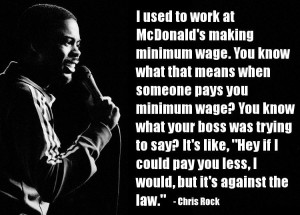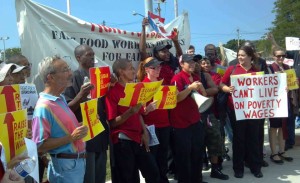On September 4th, 2014, fast food workers in Rochester, NY joined thousands of workers in hundreds of cities worldwide in going on strike. Their demands: $15 an hour and the right to form a union. Workers, alongside Metro Justice members and other community allies, after months of grassroots organizing, were able to shut down the Wendy’s on East Ridge Road for several hours. Wendy’s of Rochester lost significant profits, and workers were able to claim their first of many victories against poverty in this city.
Fast Food Strikes are Class War
The Fast Food Industry rakes in massive profits from a business model that depends on the exploitation of their workforce. We’ve all heard the oft repeated lie that those at the top have worked hard for their wealth, while those sweating and starving in fast food restaurants need to work harder if they want more money. The truth is that the fast food CEO’s make more than 1,000 times more money than the average fast food worker – fast food CEO’s are among the most well paid executives in the country, while their workers are among the lowest paid.
But we don’t have to look that high up on the chain to see that wealth doesn’t come from hard work under capitalism. In Rochester, NY every Wendy’s restaurant in the area is owned by the same man: Robert Fox. Bob did not have humble beginnings. He inherited the local Wendy’s empire from his father Richard Fox – a man who once said, “If you overpay, it’s hard to get a good return on anything.”
If wages had risen along with worker productivity generally since 1968, workers would be making $21.71/hr minimum. Instead, median hourly pay for a fast food worker is $8.69. Due to these low wages 52% of fast food workers and their families are enrolled in one or more public assistance programs such as SNAP (food stamps) Medicaid, or the Children’s Health Insurance Program (CHIP). The state subsidizes this business model built on a foundation of grinding down its workers for higher profits – to the tune of nearly $7 billion per year. Given all of this, the meritocracy argument against workers organizing and taking action for higher pay and benefits falls apart pretty easily.
 Every time a worker takes a stand by going on strike, engaging in a work slowdown, making a public statement, or talks to other fast food workers about the movement, they are fighting back against the owning class that profits from all of our misery. Fast Food Workers are standing on the front lines of a new labor movement – one that will be militant, effective, and that will bring about real improvements in the lives of all working people. Militant labor activities of the past brought the 8 hour work day, minimum wage laws, and the 40 hour work week. Low wage worker struggles today will win a living wage for all and build real worker power through direct action against the bosses.
Every time a worker takes a stand by going on strike, engaging in a work slowdown, making a public statement, or talks to other fast food workers about the movement, they are fighting back against the owning class that profits from all of our misery. Fast Food Workers are standing on the front lines of a new labor movement – one that will be militant, effective, and that will bring about real improvements in the lives of all working people. Militant labor activities of the past brought the 8 hour work day, minimum wage laws, and the 40 hour work week. Low wage worker struggles today will win a living wage for all and build real worker power through direct action against the bosses.
Worker Power over Legislative Reform
Fast Food and other low wage workers have the opportunity to fundamentally change social relationships in the workplace. By organizing and withholding their work they go straight to the root – attacking the bosses’ profits and forming relationships with their fellow workers forged in the struggle for a better life. Fast Food workers need higher pay in order to raise their families, get an education, and even to pay for basic necessities.
A change in minimum wage laws – whether in one city or nation wide – is one way for workers to get the $15 they are fighting so hard for. Seattle’s city council recently passed a $15/hr minimum wage law. This change in the minimum wage was directly connected to Fast Food organizing there. These laws are alright as far as they go – but Seattle’s new $15 hourly wage law is full of legal loopholes designed to keep many workers well under that wage for a number of years. Business groups are already mounting a legal challenge to this law.
Direct organizing among workers can suffer when efforts are funneled into campaigns to elect candidates that are making promises of a higher minimum wage. Instead, low wage workers and community allies can invest the same time, money, and effort into building a movement that is capable not only of forcing the fast food industry into a $15 standard hourly wage, but also of creating lasting worker organizations. These organizations can continue to fight for other improvements in the industry – more benefits, regular schedules, and a generally more democratic workplace. Laws and politicians can’t give workers dignity at work. Only the workers can win that for themselves.
Another World is Possible
If fast food and other low wage workers continue to organize and, with the help of community allies, build a mass movement that grows in militancy and effectiveness, we can’t know the implications of how society could change. If a living wage is the baseline for all workers, and if even fast food and retail workers are organized and connected world wide, working people could begin to have a greater sense of their agency, dignity, and their class. Through struggle, with victories and defeats, workers will increasingly understand that their interests are in conflict with the interests of the bosses.
I imagine a time when a worker is fired at Wendy’s for union activity, and every fast food worker in every restaurant in the city folds their arms and refuses to work. I imagine fast food workers taking these experiences of struggle into their communities, linking up with homeowners fighting unjust foreclosure, or helping tenants fight back against their landlords. Fast food and retail workers linking up with other militant workers in other industries, sharing experience and engaging in collective action to build power – and ultimately take back the world that rightly belongs to all working people.

